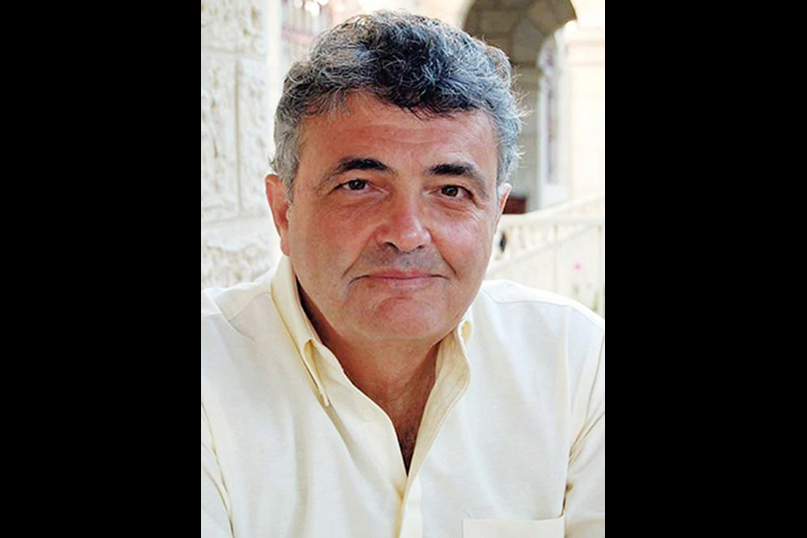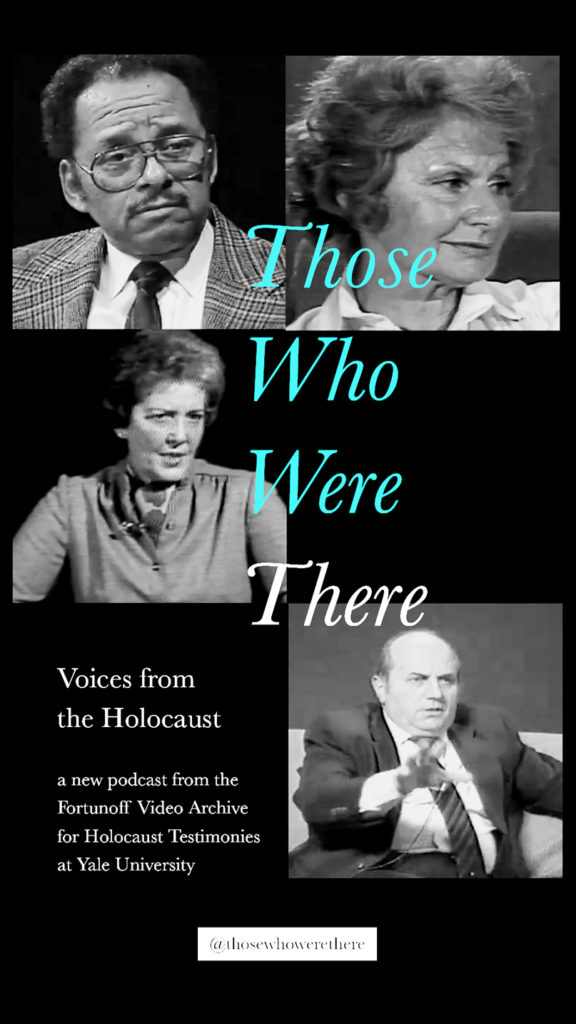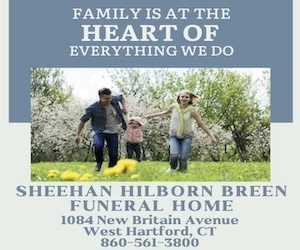
Trinity Professor Sam Kassow serves as historical advisor
By Stacey Dresner
NEW HAVEN – Yale University’s Fortunoff Video Archive for Holocaust Testimonies has produced its first podcast, potentially sharing the firsthand accounts of Holocaust survivors and witnesses with a whole new audience.
“Those Who were There: Voices from the Holocaust,” features 10 episodes of recorded interviews from the Fortunoff Archives with Holocaust survivors, resistance fighters and witnesses to the Holocaust, including a U.S. Army soldier who helped to liberate Buchenwald.

The archive came about when a collection of interviews done by the grassroots Holocaust Survivors Film Project in 1979, were donated to Yale in 1981. Since then, the Fortunoff Archive has worked to report, collect and preserve the testimonies of Holocaust witnesses and make them available to researchers, educators and the general public.
“We’ve had programs on YouTube and our website, streaming for years and those have been very useful for education,” said Stephen Naron, director of the Fortunoff Archives. “This is just a different group. Podcast listeners are a different niche in the media world. Podcast listeners that are going to be willing to listen to 20 or 30 minutes from a survivor describing something as difficult as their experienced during the Holocaust is even a niche within a niche, to be perfectly honest. But we think it’s a different listenership than the audience we have had before.”
Naron said that this is the first podcast that he knows of that uses Holocaust testimony material.
“The U.S. Holocaust Memorial Museum had a podcast that recorded live interviews, and the same with a new podcast from Sweden of all places that I just discovered. But this is the only podcast that is dedicated to bringing archival materials to a wider audience.”
Eleanor Reissa, a writer, actress and singer, introduces and narrates each episode. Her own parents were survivors.
“Many of the people you’ll hear in this podcast waited decades to tell their stories,” Reissa said. “But we are fortunate and grateful they did, and that the Fortunoff Video Archive for Holocaust Testimonies was there to collect and preserve their oral histories. Always…we must honor their efforts and listen to their stories. As we know, ‘those who do not learn from the past are condemned to repeat it.’”

The podcast episodes include the stories of Martin Schiller, a child survivor of the Skarzysko-Kamienna labor camp and Buchenwald concentration camp; Hed Kovaly, a native of Prague and survivor of Auschwitz and Gross-Rosen concentration camps; and Arne Brun Lie, a native of Oslo, Norway, who joined a resistence cell at 18 and survived Natzweiler, Dautmergen, and Dachau concentration camps.
American U.S. Army Veteran Leon Bass, an African-American from Philadelphia, talks about his experience aiding in the liberation of Buchenwald. “And that was the day I was to discover what had really been going on in Europe under the Nazis, because I walk through the gates, and I saw walking dead people…” Bass says in episode two. “And I didn’t have any way of thinking or putting a handle on it, no frame of reference. I was only 20.”
Sam Kassow, Charles H. Northam Professor of History at Trinity College in Hartford, serves as the historical advisor to the podcast. His mother, Celia Kassow z”l, tells her story in the eighth and ninth episodes. Kassow shares his own perspective as a child of Holocaust survivors in Episode 10.
“The word ‘Holocaust’ often conjures up images of an impersonal bureaucratic juggernaut, of long trains carrying millions of anonymous victims to death factories,” Kassow explained. “By contrast, the voices of ‘Those Who Were There’ offers accounts of the Holocaust that are deeply human and personal – stories of what happens to families, to former friends and neighbors, to communities, when the thin veneer of civilization is stripped away.”
Naron, who calls Kassow “a national treasure,” says that the professor’s input is invaluable to the podcast.
“The episodes are short but still very dense and filled with lots of information, and they are accompanied by a set of notes that provide historical context by Sam, which really helps to fill in the gaps because, as most of us know, [those giving testimonies] can jump around in time…testimony can be very complicated. So having a little bit of explanation will help the uninitiated gain entry into this difficult topic.”
The podcast was produced by Eric Marcus, who created the podcast “Making Gay History” and Nahanni Rous, producer and host of the Jewish Women’s Archive podcast “Can We Talk?”
“For many of the survivors and witnesses who told their stories to the Fortunoff Video Archive decades ago, it wasn’t easy to talk about what they had lived through. They did it because they wanted other people to know,” Rous said. “I feel privileged to help make that possible…this feels like sacred work to me.”
Marcus, who grew up in New York in a neighborhood with many Holocaust survivors, said that it is important, especially now, to share these stories.
“…I remember as a child hearing that number: six million killed. It was just beyond comprehending. Over the past two years working with testimonies from the Fortunoff Video Archive, I’ve come closer to understanding, one story at a time,” he said. “For the 75th anniversary of the liberation of Auschwitz, I feel it’s my obligation to bear witness to the lives of those who were there and to share their stories with those who are willing to listen.”
Main Photo: Prof. Sam Kassow








 Southern New England Jewish Ledger
Southern New England Jewish Ledger










